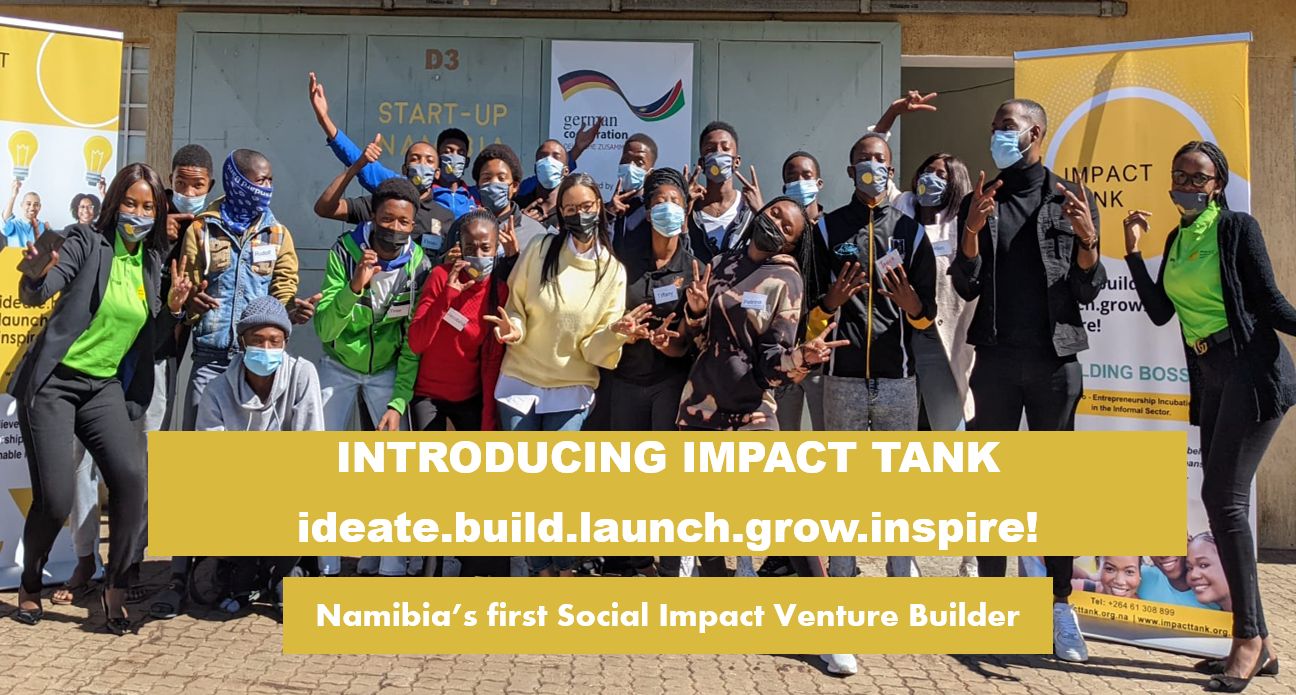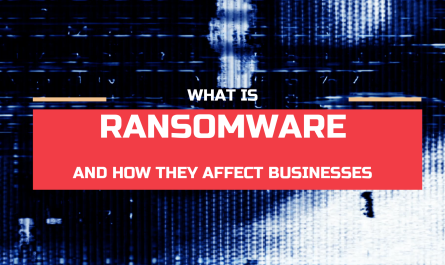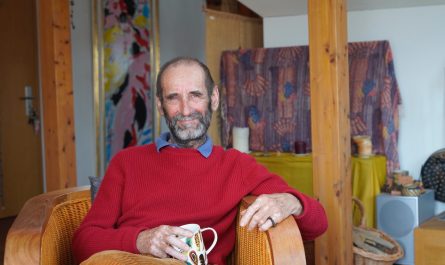For the last blog posting of this 8 part series, after sharing with you the fundamentals of Social Impact Venture Building, I would like to introduce you to the one venture builder that I am closest to, as a member of its management team, and lift the lid on some of its projects.
Impact Tank was founded in 2020 as Namibia’s first Social Impact Venture Builder after coming to the realisation that its method of using social entrepreneurship as a means to create sustainable social impact fit with the needs of the country and the gap felt by the lowest socio-economic segments therein. The first projects were funded by local arms of international development institutions and local subsidiaries of regional corporates, after encouraging feedback from these institutions for the applicability of the method and overlap with their goals.
The Approach
Together with funding and corporate partners, the approach is to identify systemically broken social issues that would not otherwise be solved without a deliberate intervention.
We use our process to design market-led, sustainable solutions based on new or adapted business models that disrupt the status quo. Then we create commercially viable companies that deliver long-term change that contributes to solving the issue for the people impacted and the planet. We then recruit a co-founding management team, scale the company, and as it’s ability to raise capital to scale from traditional capital markets, our role diminishes, leaving the growing company to reach results in the social issue originally identified and inspire action by other market-participants.
Thematic Areas
Like other venture builders, our work is organised into thematic areas, to ensure focus, clear alignment to our funding partners and improving the ability to stay abreast with the latest developments in that area. Impact Tank has chosen three, matching the interest and direct expertise of the founding team. These thematic areas are: Human Capital, The Green Economy and Food Security.
The Green Economy thematic area is focused on renewable energy, reducing the impact of human activities on the planet and the principles of the circular economy (Reduce.Reuse.Recycle). Namibia needs to increase its generation of green energy, increase its use in off-grid scenarios, and increase its recycling rates with the adoption of new mindsets.
The Food Security thematic area is focused on reducing reliance on food imports into Namibia and improving Namibia’s ability for self sufficiency in food production. Despite its reputation as a desert nation, Namibia is blessed with vast tracts of arable and irrigable land, ample fresh water resources and a long coastline that can be exploited using desalination technology. The ambition is to improve Namibia’s agricultural production, the diversity of its production and its capability via the skills of the workforce necessary to support this activity – ultimately preserving valuable foreign currency reserves and providing the nation with a plentiful and well-priced food supply.
The Human Capital thematic area targets creating professional development, income-earning and personal growth opportunities that result in a highly capable and stable workforce who are able to design and deliver the future of the country. We specifically focus on women and youth-empowerment in the informal sector as these demographics often receive the least attention from other efforts.
Sample Projects and Ventures
We start with projects to ideate solutions to systemic issues. If the hypothesis of a project can be validated, we turn it into a venture. Our ventures are commercial businesses that emerge from our projects. They need support in their early stages, yet the aspiration is for them to become independent, scale, raise capital, reach profitability, and continue to sustainably solve the systemic issue and reach the impact goals that the original project identified.
Building Bosses
Building Bosses is a micro-entrepreneurship incubation project within the informal sector. The micro-incubator takes participants, recruited from disadvantaged homes, through a 12-week program of business basics then provides seed-product to the “graduates” of the program to start their first business. In addition to the classroom learning, participants receive ongoing mentorship, access to a computer lab, computer literacy classes and the opportunity to collaborate in a community where they can foster their own business ideas.
E-Express
E-Express is a retail social venture seeking to address issues of youth unemployment, especially in the informal sector. E-Express is building an agency network of franchised, popup stores that provide income and a springboard into entrepreneurship for young adults, while creating a valuable “last-mile” distribution network for corporates who desire to expand into this sometimes difficult to reach market.
Eat Well
Eat Well is a project ideated by Impact Tank to address Namibia’s heavy reliance on imported fresh produce. The project seeks to use Aquaponics too replicate other community-based agribusiness models and adapt them to the Namibian context to deliver fresher, cheaper and more diverse produce.
Impact Tank has 7 projects/ventures in its portfolio, with others in development waiting for interest from the necessary funding partners.
Thank you for following this journey into Social Impact Venture Building during this series.
Stay tuned for more articles on this topic and feel free to reach out if anything piqued your interest!
Visit www.impacttank.org.na




Hi, you have a very nice message about social entrepreneurship in Namibia, hence there are very few studies conducted in Namibia regarding social enterprises. I am currently doing my study on Social entrepreneurship in Namibia, particularly the closing down of some social enterprises in the northern regions.
Hi Elzine
Kindly assist regarding the effects of the closing of social enterprises in Namibia.